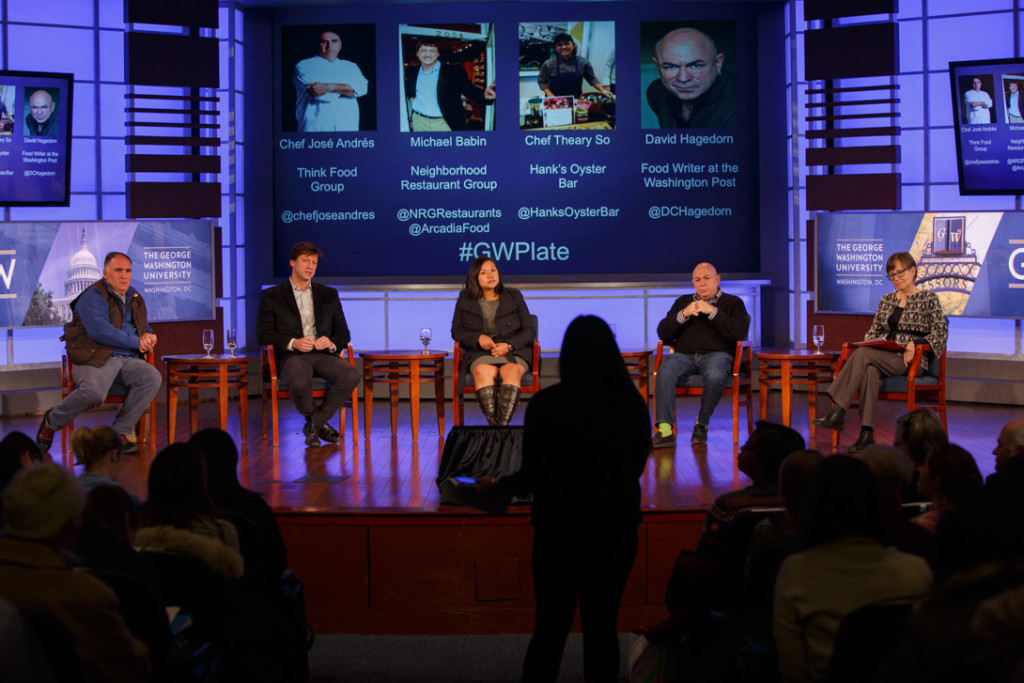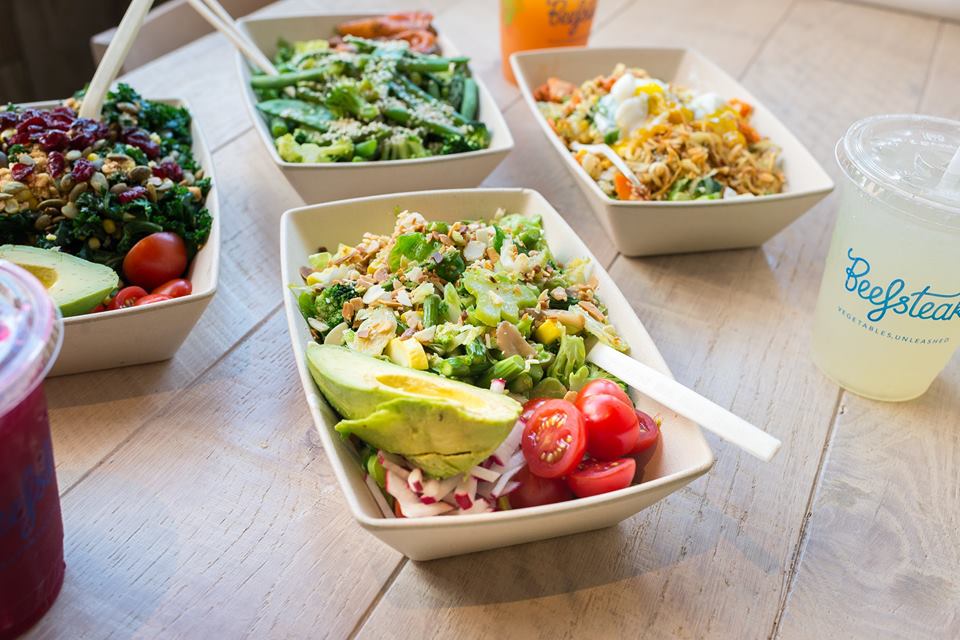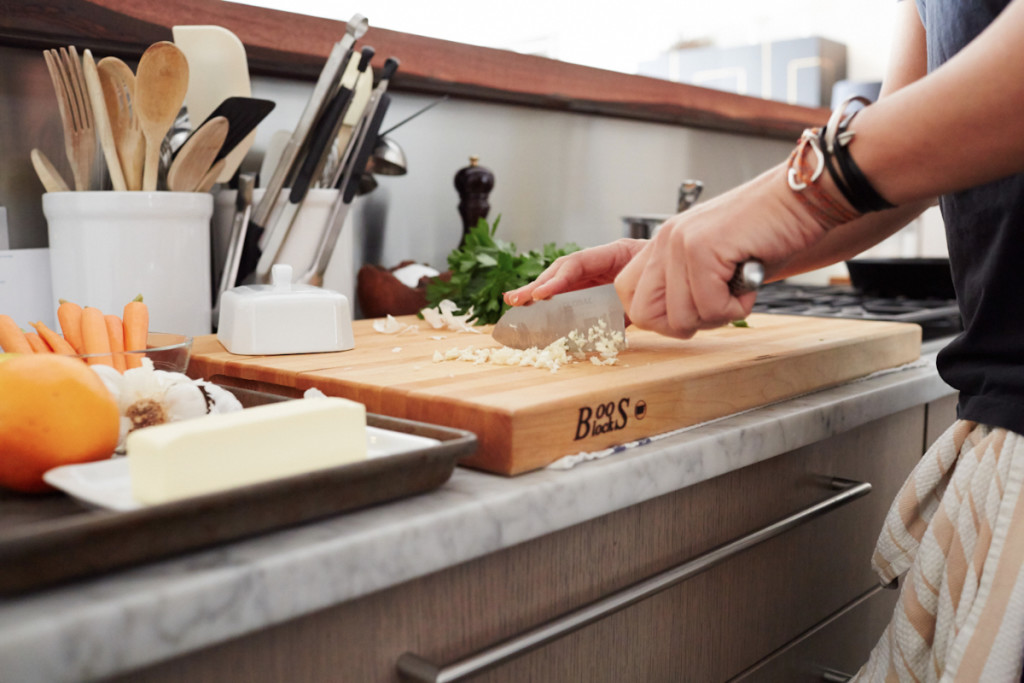On Tuesday February 10th, several big players in the DC food industry convened to discuss ways to build a “Sustainable Plate.” They included Michael Babin of the Neighborhood Restaurant Group, Theary So, the chef at Hank’s Oyster Bar, David Hagedorn, a food writer for the Washington Post, and world-renowned chef Jose Andres of Think Food Group.

Photo courtesy of gwtoday.gwu.edu
The Sustainable Plate is a course taught at GW by Dr. Kathleen Merrigan, the Executive Director of the Sustainability program. She and GW Associate Professor of Writing Abby Wilkerson moderated the panel.
We got the exclusive chance to meet and interview Jose Andres. Andres is credited with bringing the small plates dining concept to America, which he started with his first restaurant, Jaleo. Andres had the chance to train under Ferran Adrià at the famed restaurant El Bulli, and his Spanish upbringing is reflected in his cuisine.
He was named one of the world’s 100 most influential people by Time Magazine in 2012, as well as Outstanding Chef of the year by the James Beard Foundation in 2011. He now owns 17 restaurants worldwide (8 of which are in the DC, Maryland, Virginia area). Some of his most popular ones in the DMV include: Beefsteak, Zaytinya, minibar, Jaleo, and China Chilcano.

Photo courtesy of gwtoday.gwu.edu
Here’s what he had to say about his favorite restaurants, dining trends, and people who bitch about his restaurants on Yelp.
Spoon: What is your favorite restaurant in The District that you own?
JA: Minibar, its always Minibar.
Spoon: What about one in DC that isn’t yours?
JA: In DC right now, it would be Frankly Pizza, which is the favorite of my daughters and they overrule. It’s a place in the suburbs giving new meaning to a neighborhood restaurant. They do a very nice pizza, it’s not Italian, it’s just Maryland, Frankly style pizza.

Photo courtesy of franklypizza.com
Spoon: Do you have any advice for young people trying to get into the food industry?
JA: Let’s put it this way, one out of every ten Americans work in the restaurant industry. The big challenge is how do we make this one out of every ten to be people where their jobs are sustainable? By the way we pay them, by the way we structure their minimum salaries, and that we don’t have people in the restaurant industry having to go on food stamps. Because it would be very sad to think that we have people working in restaurants serving food that to make a living they have to go into further funded programs to feed their families.
This only tells me that when someone complains that the meal is too expensive, they at times should be thinking twice. I would challenge anybody to go to a restaurant, eat a meal, pay for it and then the next day go to the supermarket and try to recreate the same meal and take a look at how much you will have spent. So that’s the answer to young people, that [there is] still a great opportunity but it’s not necessarily in the restaurant business.
I think a lot of people should be getting into the lobby business, into the politics of food and trying to change the food policies of America, and why the times are so wrong that they are doing a disservice to the American people.
Spoon: What was your go-to meal in college?
JA: Well I don’t know because I never made it to college. But I would go to see [my friends] in their dorm. I had no idea but I had become a very popular guest for my use of the microwave. My friend called me saying, “Jose, Jose, I don’t know what’s wrong, I’m following your recipe and nothing is happening,” and I said, “Well, what is wrong?” He said, “Jose it’s already dark.” “What is dark?” “The pasta, it’s burning.” “What are you doing?” “You told me to put it in some oil and sauté, I am sautéing and it’s not getting any softer.” And I said, “Hold on a second, did you boil the pasta? You have to boil the pasta.” So that day I learned there is never enough information to teach somebody how to cook.
Spoon: What do you get in your beefsteak bowl?
JA: I still haven’t repeated one twice, especially being down the street, I’m always searching for the perfect bowl. I get bored easily and I have the opportunity to never get the same thing. But the last one I did that I think will make it onto the menu had Chinese cabbage, onion which is boiled and is unbelievable, with the spicy tomato sauce and the rice and sesame seed topping, with a boiled egg. I think that will be on the menu soon.

Photo courtesy of dcdiningguide.com
Spoon: And what will you call it?
JA: I don’t know yet. My daughters all want to name a bowl. But I am still waiting for my opportunity to name a bowl. I haven’t named a bowl yet, I am so upset. I have been overruled by everybody, but don’t worry one day I am going to go in and do everything myself.
Spoon: What do you see as the new dining trend of 2016?
JA: The new dining trend of 2016 is that there is not going to be a dining trend. Because we have a lot of food writers as employees, we are always looking at trends. Sometimes, something hasn’t even become popular at the neighborhood level and they are already calling it a trend.
In this day and age every trend can be happening in every corner, even by a restaurant that didn’t even open. In the end, the trends should be more for what people really cook at home, not from what chefs cook at a restaurant. I think sometimes we are very blind to what people cook at home. We are obviously more interested in what a professional chef is cooking at a new restaurant. But what I can tell you is, my wife doesn’t follow trends, my wife follows what she feeds my daughters and that to me is the true trend. If it seems like a silent trend or a blind trend, that is a true trend.

Photo courtesy of eye-swoon.com
Spoon: Why did you choose to have so many restaurants in DC, what makes DC special?
JA: So I can have food critics criticizing my food all the time. I am a true believer that jobs should be created and with chefs like me opening restaurants all the time we give opportunities for food critics to keep having a job. We give a reason for Yelp to exist and have people bitching positively or negatively. I know a lot of people think bitching is bad but it can be positive too. Even they don’t realize.
That’s the reason I open so many restaurants, to give people a reason to spread their thoughts. I have so many restaurants because I like to tell stories, and I tell my stories through the restaurants. I’m not the guy who [thinks] a restaurant that is four walls and a kitchen, I am too young for that. I’m too young for one restaurant.
Well, there you have it. It is up to us to take Jose’s advice to heart and push for a change. With the elections coming up, see what the candidates’ food policies are. Get back in the kitchen and set your own dining trends, ones that inspire you to eat more fruits and vegetables or share a meal with your friends. And next time you’re bitching about a restaurant on Yelp, don’t feel bad about it: Jose is proud of you.



